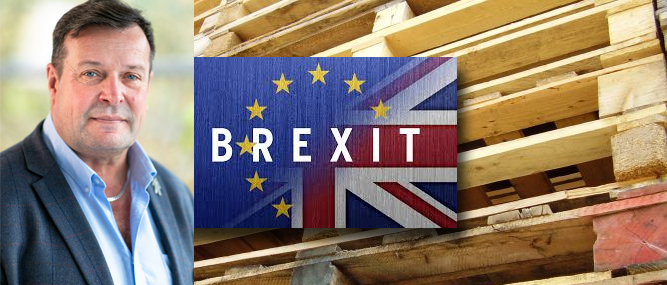Pallet Enterprise: Why has Brexit become such a major concern for pallet companies in the United Kingdom and Europe?
Dye: This is solely due to the fact that by leaving the European Union, the UK is no longer covered by the ISPM-15 EU exemption that has been in place since the introduction of the Plant Health Standard in the early 2000s. After Jan. 1, 2021, it will be a legal requirement for all wood packaging material moving in both directions between the UK and the EU to comply with ISPM-15 treatment and marking requirements.
The UK pallet industry has made it very clear from the beginning that it was most certainly not opposed to ISPM-15 compliance being rolled out, as it is vitally important that any potential risks to forests is minimized. The concern was the timing.
Pallet Enterprise: What are UK pallet companies doing to be ready for the Brexit impact?
Dye: The pallet industry has been and is continuing to work hard in gearing up to meet the deadline date. Many pallet manufacturers have been increasing their heat-treating capacities with new investments in equipment although the installation of this equipment has been seriously affected due to COVID-19 – for example, engineers not being able to travel, etc.
Pallet manufacturing and reconditioning dealers have been reviewing their shift patterns and have been successfully increasing the capacity of their existing equipment – moving to 24/7 shift patterns, for example, which in many cases more than doubles production capacity without major new investment.
Pallet Enterprise: As an industry leader in Europe, how do you see the overall pallet market changing in the next five years? (Let’s forget about Brexit for a moment.)
Dye: With my TIMCON hat on, I am very excited about the future of the wooden pallet market. Carbon neutral policies in countries are very welcomed. The UK government has stated they wish to achieve this by 2050. By using wooden packaging materials – and more specifically, reusing them rather than just recycling them – businesses will be helping the country achieve the UK government’s net zero carbon emissions target of 2050 and the
Scottish government’s target of 2045. Wood packaging material acts like a carbon safe. All the carbon dioxide collected while the tree was growing actually remains in the wood fiber until the wood finally reaches its end of life cycle.
A typical wooden pallet contains about 27.5 kg (60 pounds) of absorbed carbon dioxide. It continues to store the carbon until the end of its useful life. By using wood packaging material designed using the Pallet Design System™ to maximize the life cycle of the pallet and reusing pallets, businesses can show their customers that they are being environmentally responsible.
Pallet Enterprise: Why do you think wood remains king of the pallet world?
Dye: Wood pallets are made from a natural material harvested from renewable and sustainable forests. They are reusable, repairable, recyclable, and, at the end of the life cycle, biodegradable.
Wooden packaging is the most cost-effective method of transporting goods and is recognised as one of the best examples of a circular economy. It has unrivalled environmental and hygienic credentials: wood absorbs carbon from the atmosphere as it grows and locks it in until it reaches the end of its useful life, and it is ultimately recycled. Wooden packaging has been the preferred choice for many years and will continue to be so for many years to come.
[John Dye is the head of the Timber Packaging and Pallet Confederation (TIMCON), a pallet industry trade association in the United Kingdom. He also is technical and industry affairs director-manufacturing for Scott Pallets in the United Kingdom.]




